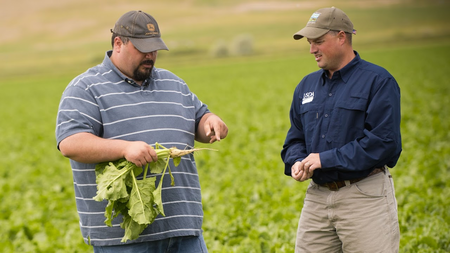NRCS Programs
NRCS Programs
The Boulder Valley and Longmont Conservation Districts work hand-in-hand with NRCS staff and landowners to address local resource concerns.
Conservation Technical Assistance
Conservation technical assistance is the help NRCS and its partners provide to land users to address opportunities, concerns, and problems related to the use of natural resources and to help land users make sound natural resource management decisions on private, tribal, and other non-federal lands. This assistance may be in the form of natural resource assessment such as pasture condition, invasive species, irrigation systems, etc. Technical assistance can lead to the development of a conservation plan, which may serve as a springboard for those interested in participating in USDA financial assistance programs. CTA planning can also serve as a door to financial assistance and easement conservation programs provided by other Federal, State, and local programs.
NRCS and its partners provide technical assistance as a voluntary program that is delivered to private individuals, groups of decision-makers, tribes, units of governments, and non-governmental organizations. All owners, managers, and others who have a stake and interest in natural resource management are eligible to receive technical assistance from NRCS. To receive technical assistance, the individual may contact their local NRCS office or the local conservation district.
The working relationships that landowners and communities have with their local NRCS staff are unique. One-on-one help through flexible, voluntary programs occurs every day in local NRCS offices across the country. It is the way NRCS does business, and it works. To obtain conservation technical assistance, contact your local NRCS office.
Financial Assistance
NRCS offers voluntary programs to eligible landowners and agricultural producers to provide financial and technical assistance to help manage natural resources in a sustainable manner. Through these programs the agency approves contracts to provide financial assistance to help plan and implement conservation practices that address natural resource concerns or opportunities to help save energy, improve soil, water, plant, air, animal and related resources on agricultural lands and non-industrial private forest land.
Colorado Financial Assistance Programs
Conservation Innovation Grants (CIG)
CIG is a voluntary program intended to stimulate the development and adoption of innovative conservation approaches and technologies while leveraging Federal investment in environmental enhancement and protection, in conjunction with agricultural production.
Conservation Stewardship Program (CSP)
CSP is a voluntary conservation program that encourages producers to address resource concerns in a comprehensive manner by undertaking additional conservation activities, while improving, maintaining, and managing any existing conservation activities.
Environmental Quality Incentives Program (EQIP)
EQIP is a voluntary program that provides financial and technical assistance to agricultural producers through contracts up to a maximum term of ten years in length.
Emergency Watershed Protection Program (EWP)
EWP was established by Congress to respond to emergencies created by natural disasters. The EWP Program is designed to help people and conserve natural resources by relieving imminent hazards to life and property caused by floods, fires, drought, windstorms, and other natural occurrences.

